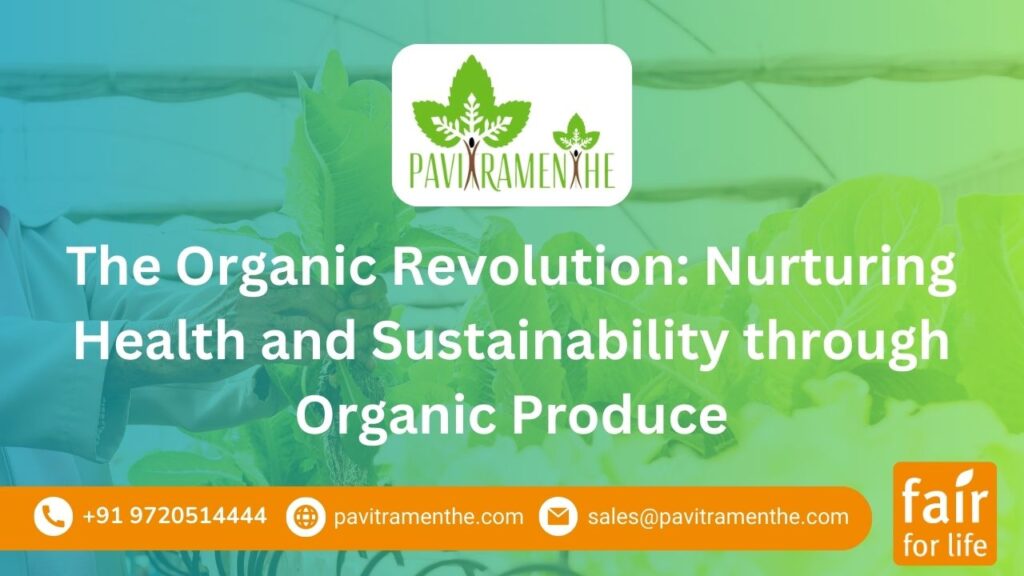In today’s fast-paced world, where convenience often takes precedence over health, organic produce has emerged as a beacon of hope for those seeking a healthier, more sustainable lifestyle. Organic produce is not just a trend but a conscious choice that individuals are making to protect their health and the environment. In this comprehensive guide, we will delve into the world of it, exploring its benefits, the science behind it, and how it contributes to a sustainable future.
What Is Organic Produce?
Organic produce refers to fruits, vegetables, grains, and other agricultural products that are grown without the use of synthetic pesticides, herbicides, genetically modified organisms (GMOs), or synthetic fertilizers. These products are cultivated using natural farming methods that prioritize soil health, biodiversity, and sustainability.
The Organic Certification Process:To ensure that a product is truly organic, it must undergo a rigorous certification process. This process involves:
Soil Testing: The soil used for cultivation is tested to ensure its quality and absence of harmful chemicals.
Seed Selection: These farmers use non-GMO seeds that are adapted to local conditions.
Natural Pest Control: Organic farmers rely on beneficial insects, companion planting, and other natural methods to control pests.
Crop Rotation: Crop rotation is used to prevent soil depletion and enhance nutrient levels naturally.
Sustainable Practices: Organic farming emphasizes water conservation, responsible waste management, and energy-efficient practices.
Consuming organic produce offers numerous health advantages:
Reduced Pesticide Exposure: Organic fruits and vegetables have lower pesticide residues, reducing health risks.
Also Read: Organic Essential Oils in Bareilly
Nutrient-Rich: Organic produce often contains higher levels of essential nutrients like vitamins and antioxidants.
No GMOs: Organic foods are non-GMO, ensuring that you avoid genetically modified organisms with unknown long-term effects.


Organic farming has a positive impact on the environment:
Soil Health: Organic farming practices improve soil structure, fertility, and microbial diversity.
Biodiversity: Organic farms support a diverse ecosystem, preserving native plant and animal species.
Reduced Pollution: Organic agriculture reduces the release of harmful chemicals into the environment.
Water Conservation: Organic farming techniques prioritize efficient water usage and reduce water pollution.
Taste and Flavor: Many enthusiasts of it claim that it tastes better than conventionally grown food. The absence of synthetic chemicals and the focus on soil health can result in enhanced flavors, textures, and aromas.
Pesticides and Herbicides: One of the primary differences between organic and conventional produce is the use of pesticides and herbicides. In conventional farming, synthetic chemicals are often employed to control pests and weeds.
Genetic Modification: Another critical distinction is the use of GMOs. Conventional agriculture often employs genetically modified crops, which can have uncertain long-term effects on human health and the environment. By definition, is non-GMO, offering a safer choice for consumers concerned about the potential risks associated with genetically modified organisms.
oil Health: Organic farming prioritizes soil health through practices such as composting, cover cropping, and reduced tillage. Healthy soil promotes better nutrient absorption by plants, resulting in more nutritious and flavorful. Conventional farming, on the other hand, can lead to soil degradation due to the heavy use of synthetic fertilizers and pesticides.
Soil Microbiology: Healthy soil is the cornerstone of it. Research has shown that it practices enhance soil microbiology by promoting the growth of beneficial microorganisms. These microorganisms contribute to nutrient cycling, disease suppression, and improved plant health.
Nutrient Density: Several scientific studies have compared the nutrient content of organic and conventional produce. Research published in the British Journal of Nutrition and other reputable journals suggests that organic fruits and vegetables often contain higher levels of essential nutrients like vitamin C, iron, and antioxidants.
Pest Control: For example, ladybugs are used to combat aphids, while nematodes prey on harmful soil-dwelling pests. These biological control agents reduce the need for synthetic pesticides and contribute to the sustainability of organic farming.
Biodiversity: One of the key goals of organic farming is to protect biodiversity. By avoiding the use of synthetic chemicals and GMOs, organic farms provide a safe haven for native plants, insects, and wildlife. This preservation of biodiversity is crucial for maintaining a balanced ecosystem.
Organic farming minimizes its environmental footprint in several ways:
Reduced Chemical Runoff: Organic farms produce fewer pollutants that can contaminate water bodies.
Lower Greenhouse Gas Emissions: Organic farming practices often result in lower emissions of greenhouse gases compared to conventional farming.
Sustainable Water Management: Organic agriculture emphasizes water conservation and responsible irrigation practices.
Soil Regeneration: Organic farming focuses on building healthy soils that can sustain crops for generations. Practices like crop rotation, cover cropping, and organic matter addition contribute to soil regeneration, ensuring that agricultural land remains productive without soil degradation.
Buying Organic Produce:When purchasing organic produce, consider whether it is locally sourced or imported. Buying local organic produce supports regional farmers and reduces the carbon footprint associated with transportation. Additionally, local produce is often fresher and more environmentally friendly.
Seasonal Availability:Organic produce availability can vary by season. Embrace seasonal eating to enjoy the freshest and most flavorful organic fruits and vegetables. Seasonal produce is often more affordable and requires fewer resources for cultivation.
Reading Labels: Look for the “USDA Organic” label when buying it in the United States. This certification ensures that the product meets strict organic standards. In other countries, similar certification labels apply. Familiarize yourself with these labels to make informed choices.
Organic Is Too Expensive: it may have a slightly higher price tag than conventional options, but the long-term benefits to your health and the environment outweigh the cost difference. Additionally, buying in-season and locally can help make organic options more budget-friendly.
Organic Is Less Accessible: it is becoming increasingly accessible. Many supermarkets now offer a wide range of organic products, and local farmers’ markets are excellent sources of fresh, and additionally, community-supported agriculture (CSA) programs provide convenient access to organic fruits and vegetables.
Organic Is Not Necessary: Some argue that it is unnecessary because conventional food is safe to consume. However, the potential risks associated with pesticide residues, GMOs, and soil degradation make the choice to go organic a prudent one for many consumers.

